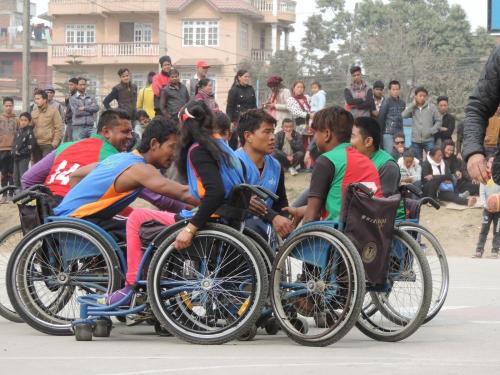
On February 6 I attended the Nepal Spinal Cord Injury and Sports Association (NSCISA) Awareness and Disability Sports Day Celebration at Sifal Chour, Gaushala. Altogether, there were more than 60 athletes, both men and women, who participated in playing wheelchair basketball. The basketball court was located in an open field and there were many spectators. This kind of event is vital for helping to bring about more societal inclusion and acceptance of persons with disabilities.
The level of competition and intensity was very high. Men and women played together something which we don’t often see among mainstream competitions. The authentic level of sportsmanship and camaraderie showed itself throughout the day but especially at the end of each game when the players gathered at center court to shake hands. There were no gender issues in these specific matches a lesson which others in the country might aspire to; everyone, no matter who they are, was considered an equal on the court.
There are other lessons to be learned from disability sports. It is those of us without a physical disability who put up barriers that prevent people with disabilities from playing, e.g. I’ve seen steps on many types of playing courts, making it difficult to get onto the court. Competition is not necessarily about winning a medal, although this does remain a priority for many; it is more about having the opportunity to play and interacting with friends. Those participating in disability sports do not take any part of this for granted, it is everyone’s right to play, but it is often very challenging to travel from one’s residence to the playing field.
Because of the upsurge in disability sports playing in Nepal there is currently a great opportunity to make major impacts. But this is going to take the development of partnerships especially among all of the organisations working in this field. It’s going to take a real focus on people with disabilities and not necessarily what organisations want, but what the people want.
Some preliminary work has already started on this partnership. Existing Nepali legislation regarding persons with disability has been reviewed and currently informal discussions are taking place regarding the best way to develop a disability sports network. If a formal agreement could be reached this network would work on promoting and coordinating disability sports, advocacy, maybe even determining possible alternatives for bringing the two Nepal Paralympic groups together. All of these tasks are necessary if disability sports is to really move forward with a focus on the players, ultimately creating more societal inclusion.
It’s never enough in a partnership to provide “lip service” stating that, “yes we want to collaborate”. This is more about finding the will, putting organisational needs second and persons with disability first. As I wrote in last week’s column, wouldn’t it be a phenomenal showcase, not only in Nepal, but also throughout Asia to have a wheelchair basketball league throughout the country that was supported by all disability sports organisations? If a league can be formed with basketball than why not football, cricket (site impaired), swimming and any other sport that people wanted to participate in.
Although we have numerous difficulties in Nepal, we are at the cusp of some great partnerships when it comes to persons with disabilities. From my more than 3.5 years of living in Nepal I know that there are tremendous struggles to reach a goal. Things just aren’t easy. But if the groups involved in disability sports can individually organise fantastic events as bringing 60 athletes together to play wheelchair basketball on a Saturday, then imagine what they can do if they are willing to not only talk but to jointly collaborate in promoting the rights of persons with disability. Sooner rather than later Nepal can become a shining example of what an inclusive society really looks like.










Add new comment